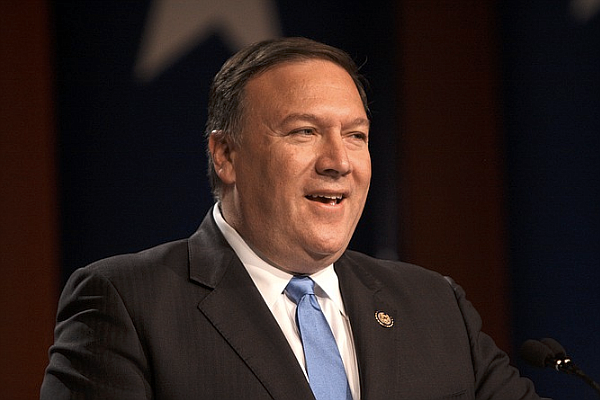Secretary of State Mike Pompeo said Monday that he submitted a formal notice to the United Nations. That starts a withdrawal process that does not become official for a year. His statement touted America's carbon pollution cuts and called the Paris deal an "unfair economic burden" to the U.S. economy. Photo courtesy Flickr/Gage Skidmore
WASHINGTON (AP) — The United States has told the United Nations it has begun the process of pulling out of the landmark 2015 Paris climate agreement.
Secretary of State Mike Pompeo said Monday that he submitted a formal notice to the United Nations. That starts a withdrawal process that does not become official for a year. His statement touted America's carbon pollution cuts and called the Paris deal an "unfair economic burden" to the U.S. economy.
Nearly 200 nations signed the climate deal in which each country provides its own goals to curb emissions of heat-trapping gases that lead to climate change.
"In international climate discussions, we will continue to offer a realistic and pragmatic model — backed by a record of real world results — showing innovation and open markets lead to greater prosperity, fewer emissions, and more secure sources of energy," Pompeo said in a statement.
With a hand-delivered letter, the U.S. is the first nation to pull out of the deal. Agreement rules prevented any country from pulling out in the first three years after the Nov. 4, 2016, ratification.
President Donald Trump has been promising withdrawal for two years, but Monday was the first time he could actually do it.
Trump's decision was condemned as a reckless failure of leadership by environmental experts, activists and critics such as former New York City Mayor Michael Bloomberg.
"Donald Trump is the worst president in history for our climate and our clean air and water," said Michael Brune, the executive director of the Sierra Club. "Long after Trump is out of office, his decision to withdraw the United States from the Paris Agreement will be seen as a historic error."
The agreement set goals of preventing another 0.9 degrees (0.5 degrees Celsius) to 1.8 degrees (1 degree Celsius) of warming from current levels. Even the pledges made in 2015 weren't enough to prevent those levels of warming.
The deal calls for nations to come up with more ambitious pollution cuts every five years, starting in November 2020. Because of the expected withdrawal, the U.S. role in 2020 negotiations will be reduced, experts said.
Climate change, largely caused by the burning of coal, oil and gas, has already warmed the world by 1.8 degrees (1 degree Celsius) since the late 1800s, caused massive melting of ice globally, triggered weather extremes and changed ocean chemistry. And scientists say, depending on how much carbon dioxide is emitted, it will only get worse by the end of the century, with temperatures jumping by several degrees and oceans rising by close to 3 feet (1 meter).
Trump has been promising to pull out of the Paris deal since 2017, often mischaracterizing the terms of the agreement, which are voluntary. In October, he called it a massive wealth transfer from America to other nations and said it was one-sided.
That's not the case, experts said.
For example, the U.S. goal — set under President Barack Obama — had been to reduce carbon dioxide emission in 2025 by 26% to 28% compared with 2005 levels. This translates to about 15% compared with 1990 levels.
The European Union's goal was to cut carbon pollution in 2030 by 40% compared with 1990 levels, which is greater than America's pledge, said Rob Jackson, a Stanford University professor and chairman of the Global Carbon Project. The United Kingdom has already exceeded that goal, he said.
"The U.S. agreement is not a tax on the American people. There is no massive wealth transfer," said Climate Advisers CEO Nigel Purvis, who was a lead State Department climate negotiator in the Clinton and George W. Bush administrations. "In fact, the agreement obligates no country to make any financial payments."
Pompeo said U.S. net greenhouse gas emissions dropped 13% from 2005 to 2017 "even as our economy grew over 19 percent."
Then, in 2018, carbon dioxide emissions increased 2.7%, according to the Energy Information Administration, mostly due to extreme weather and the economy. This could lead to more nations turning their back on efforts to slow down an ever warming world, experts said.
"The Trump Administration's abandonment of action on climate change gives other countries an excuse not to act either. They ask — if the richest country, the one that has contributed the most to the load of greenhouse gases in the atmosphere, isn't willing to act, why should we?" said Michael Gerrard, who heads Columbia Law School's climate change legal center. "If someone other than Donald Trump is elected, he or she will almost certainly rejoin Paris, and the rest of the world will welcome us back with open arms."
Copyright Associated Press. All rights reserved. This material may not be published, broadcast, rewritten, or redistributed.



Comments
Use the comment form below to begin a discussion about this content.
comments powered by Disqus